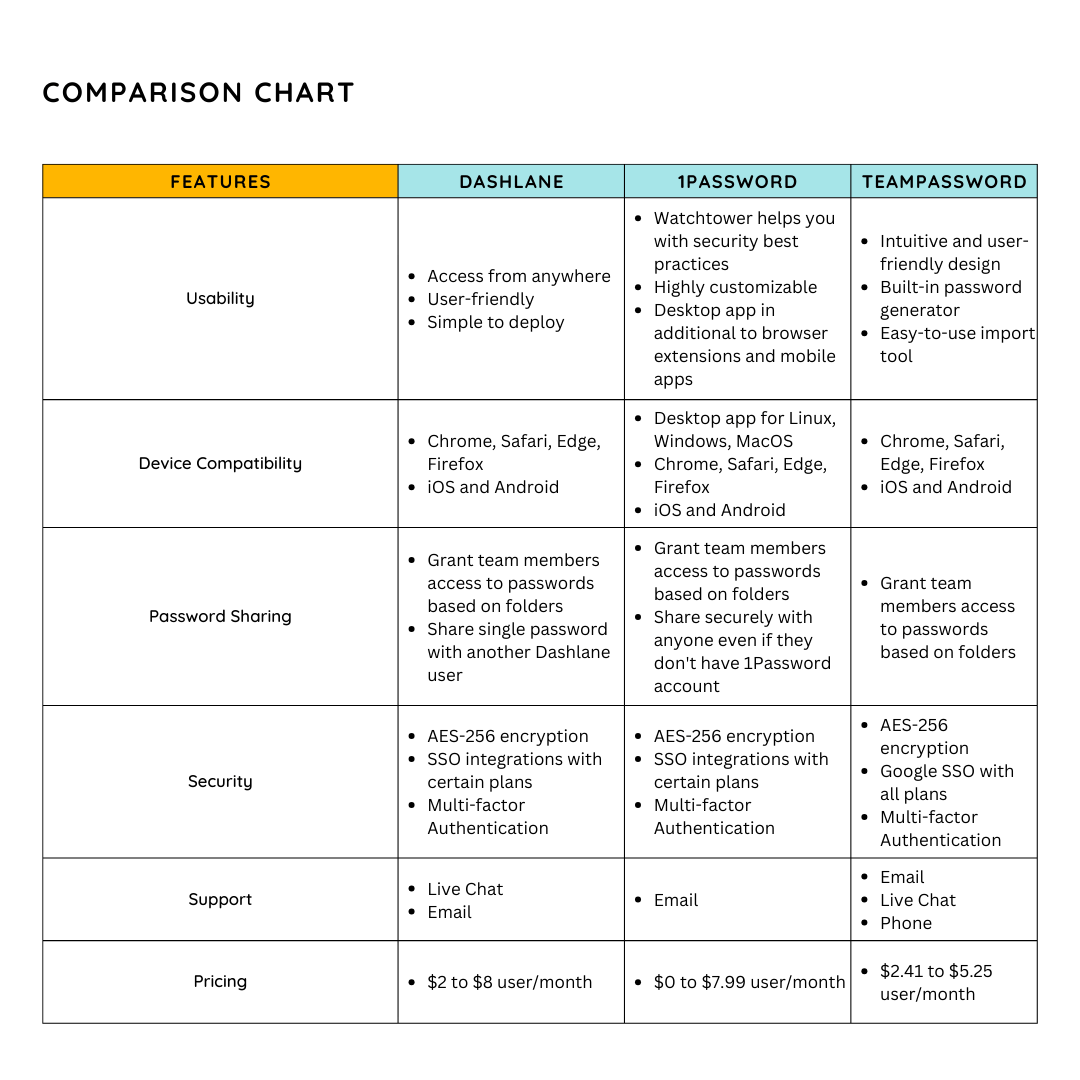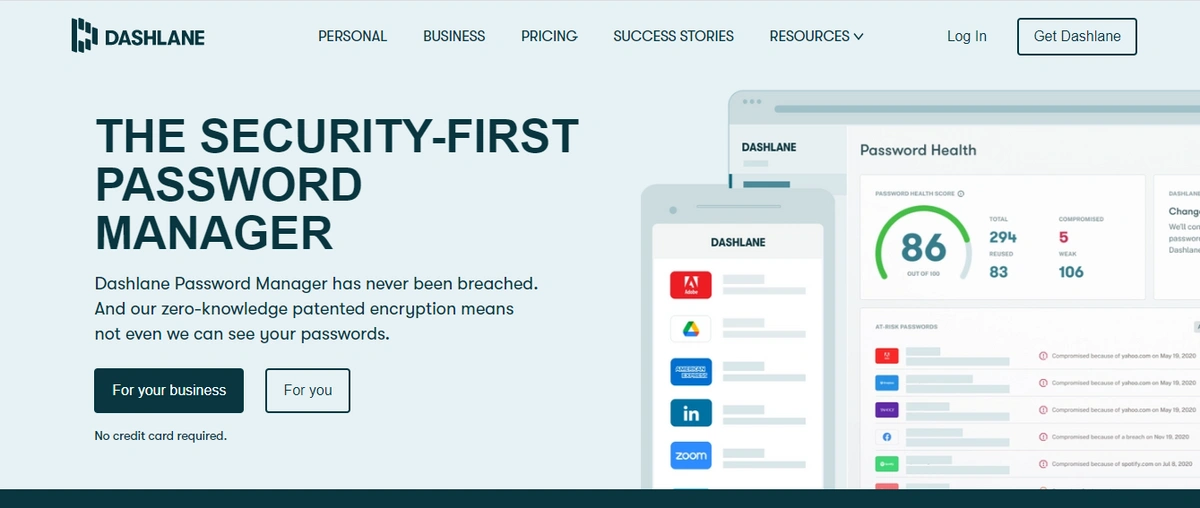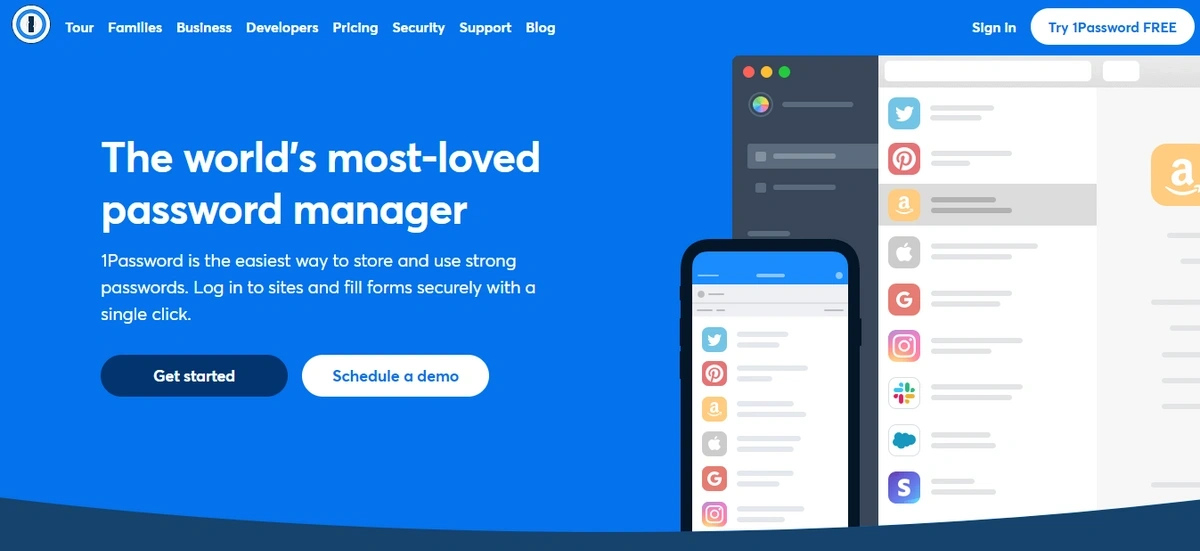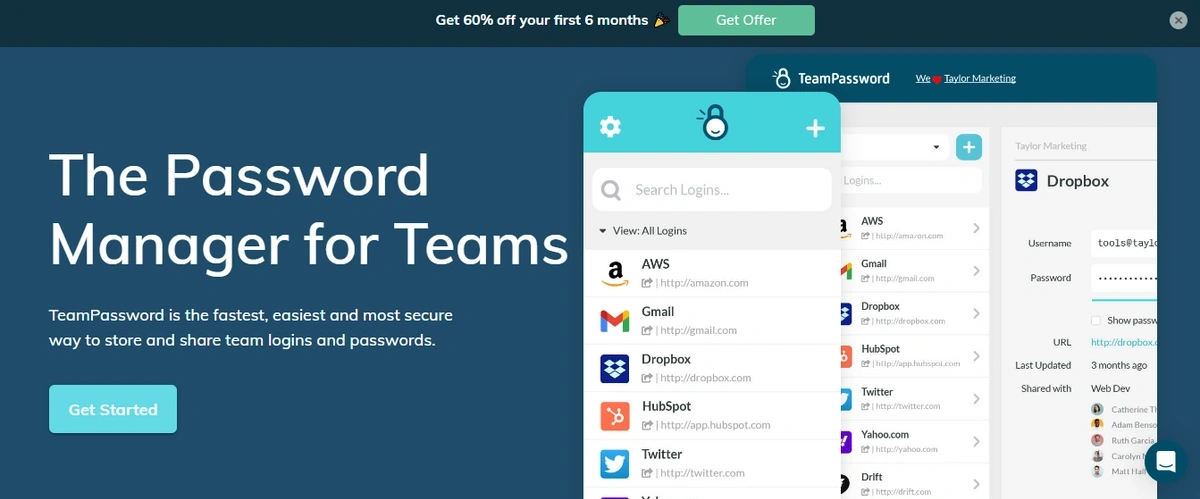Dashlane vs 1Password | Competitor Comparison
In the digital age, our brains are flooded with passwords. The average person is estimated to hold 34 active passwords! If you consider this in combination with the login info we need at work, that number jumps significantly. Even with a great memory, no one should have to memorize all those numbers and symbols.
You never want to compromise security for memorability. While '123456' is easy to remember, it's also easy to guess. As our passwords get more complicated, we need a secure and accessible place to store them. Enter password managers.
Password managers have become an increasingly popular way to keep login info secure. With many helpful features that keep your passwords stored away safely while still being accessible to you and your whole team, you'll never have to worry about the security of your various accounts.
With so many password managers on the market, it's hard to know which one is best for you or your company. Fortunately, we've got you covered! We've compiled an in-depth comparison between the top passwords available so you'll have all the information you’ll need to choose the best option for you.
In this article, we'll look at Dashlane, 1Password, and TeamPassword. Each manager has different strengths and weaknesses. What's good for personal use may not be the best fit for a business. With our side-by-side comparison, you'll be able to review the different features of each password manager and find what suits your needs.
Table of Contents
Features Overview
Dashlane Features
Dashlane brands itself as a "security-first password manager." Dark web monitoring and high-scoring encryption have protected the software from ever being breached. It includes an array of helpful features including on-the-go access, unlimited sharing, and a unique password generator.
1Password Features
1Password is simple and accessible. It is a strong choice for those looking for a personal-use password manager but has less comprehensive options for teams and businesses. It scores high on encryption, using Watchtower to alert you of suspicious activity.
TeamPassword Features
TeamPassword prides itself on being the password manager built for teams and businesses. TeamPassword is arguably the most business-friendly of the three, with affordable rates and easy sharing capabilities.
Its features include:
- Automated reminders to update records and refresh passwords
- Favorites list
- Google single sign-on with every plan
- Integrated TOTP authenticator
- Unlimited passwords and password groups
It has been voted one of the most user-friendly password managers for businesses.
Common Features
Before we break down how each password manager is different, let's look at what they all have in common! Sometimes companies advertise certain features as if they're unique to their product, when in fact that feature is part of the industry standard. That's why it's important to know what's shared between password managers before you pick one.
Common features of Dashlane, 1Password and Team Password:
- Custom Groups for Team Organization
- Two-Factor Authentication
- Group Sharing
- Password Generator
Whichever password manager you choose, you can expect these helpful features! Keep in mind that while these features are shared among the different products, they will differ in how they operate based on the company.
Unique Features
Dashlane Unique Features
Dashlane has a few features that aren't offered by the competition. Unlike 1Password and TeamPassword, Dashlane allows you to change all of your passwords with just one click. Other unique features include a public wi-fi VPN, advanced reporting, enterprise mass deployment and identity theft protection
1Password Unique Features
1Password's most significant unique feature is Travel Mode. Once you leave your local network, your data becomes more vulnerable. This risk increases when you cross national borders. 1Password allows you to choose which vaults you'd like to make accessible when you travel. That way, when you turn on Travel Mode, only vaults marked travel safe will be available to you and other vaults will have an added layer of security.
TeamPassword Unique Features
Unlike Dashlane and 1Password, TeamPassword is specifically built for teams, and unlike its competitors, TeamPassword prioritizes simplicity. This platform allows you to build an unlimited number of groups to easily share passwords with a small subset of collaborators or your entire team. This can be done in just a couple of clicks and is so intuitive that password management is one training you won't need to add to your onboarding process. TeamPassword's interface is designed to store information for many groups in one secure location.
Usability
Dashlane Usability
Dashlane features an elegant user interface. Like its competitors, it has many features that prioritize security like breach notifications and dark web insight alerts making it a multi-skilled platform.
1Password Usability
1Password scores high on usability because of its many options. and changes can be made quickly without sacrificing security. However, users have criticized its complexity, meaning it may not be the answer for regular basic use.
TeamPassword Usability
TeamPassword has worked hard to create an intuitive UI experience that every user will love. Extensive testing has gone into TeamPassword's platform to ensure that managing your business' login info is as efficient and enjoyable as possible. Furthermore, TeamPassword has live customer support and routinely surveys its users to better meet their needs.
Sharing Capabilities
Dashlane Password Sharing
Dashlane sharing enables users to share multiple passwords with multiple people using sharing groups. However, users must have a Dashlane account.
1Password Password Sharing
With 1Password, sharing is an easily accessible feature. You can share your passwords with anyone regardless of if they have an account.
TeamPassword Password Sharing
Quite simply, TeamPassword was built for sharing. With TeamPassword, your organization is made up of groups of records. Typically, these Groups are attached to a department (Marketing, Sales, Billing) or projects (iOS Dev Team). Users can be added and removed from the Groups with a couple of clicks. Users can also add a record they've made to one or multiple Groups. However, like Dashlane, users must have an account in order to share passwords.
Security
Dashlane Security Features
Dashlane uses AES-256 encryption to securely transfer your data to its servers. They use dark web monitoring to prevent threats to your data. They also have a VPN Wi-Fi feature that keeps your information safe when you're on the go.
1Password Security Features
1Password also uses AES-256 encryption but instead of dark web monitoring, they use Watchtower, which alerts users of potential threats. 1Password uses end-to-end encryption so only you have access to your password information.
TeamPassword Security Features
TeamPassword uses, you guessed it, AES-256 encryption! Google Single Sign-on is available to all users regardless of the size of your plan. This makes it easier for admins to manage users and for users to log in. TeamPassword uses backend fraud analytics to detect and block suspicious activity. Its platform features built-in audit tools for admins that enables them to see which members have accessed, edited, and removed which records. Admins can also make two-factor authentication mandatory across the organization.
Device Compatibility
When it comes to device compatibility, these three password managers match up evenly.
Dashlane, 1Password and TeamPassword are compatible with Windows and Mac OS. They all have a mobile app that is compatible with both iPhone and Android. All of them are also available as web browser apps, for faster access.
Pricing
All three password managers have great features but, when it comes down to it, price is going to place a huge role in which one is right for you.
Dashlane Pricing
- $0 to $8.99 per month per user
- Team plan: $5 per month per user
- Business: $8 per month per user
1Password Pricing
- $2.99 to $7.99 per user per month
- Teams Plan: $19.95 per month
- Business Plan: $7.99 per month per user
TeamPassword Pricing
Of all the ways Dashlane, 1Password and TeamPassword differ, the price may be the most significant. Dashlane and 1Password offer similar price points across the board but their value will depend on your priorities. Dashlane is the only manager that offers a free version of its product, however, it has limited capabilities. This has little value for businesses.
TeamPassword is in a tier of its own. TeamPassword offers it's yearly plan for $2.41/user/month with a minimum of 3 users. If you need more advanced features, you'll pay $5.25/user/month on the annual Enterprise plan.
Get Started with TeamPassword
Each password manager has distinct strengths and weaknesses. Dashlane has an extensive list of features. 1Password has a refined user interface for administrative control. TeamPassword is the most affordable and is the only password manager of the three that is built specifically with teams and businesses in mind.
Only you can decide which password manager is the best option for you. Hopefully, you now have the knowledge and tools you need to find the platform that properly suits your needs!
Enhance your password security
The best software to generate and have your passwords managed correctly.



